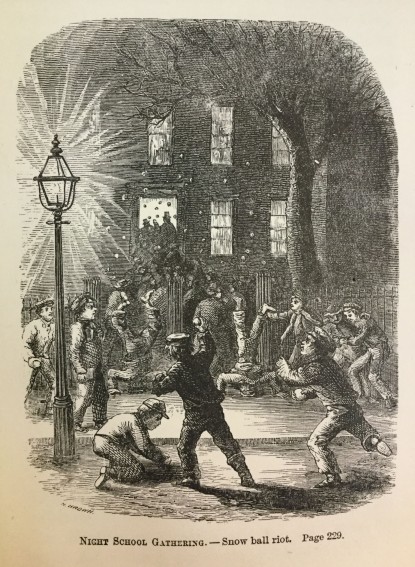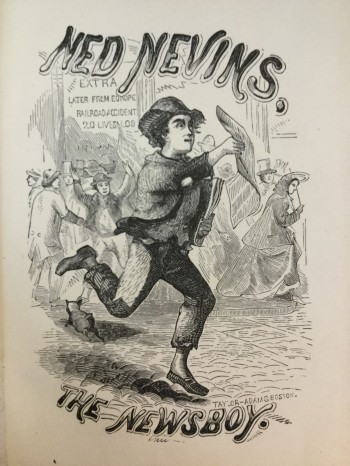Our latest bad children of history, from Ned Nevins, the News-boy; or, Street Life in Boston (1867), have instigated a snow ball riot, pelting unfortunate adults before the police arrive to calm the fray.

The accompanying text is terrific:
Now some ladies and gentlemen pass the crowd to enter the building; when, plump, plump, plump, the snowballs strike against the door before them, and dash into their faces. “Oh dear! they are killing me; I am all covered with snow; open the door, let me in; I shall die!” cries one lady, leading half a dozen others, who are muttering the same complaint. “Oh the rascals! they ought to be hung,” cries another: “they have spoiled my new bonnet.” Still another, “Oh dear! the snow is running down my neck. Oh! my bosom is full of snow.”
Lest one fear that author Henry Morgan, P.M.P. (Poor Man’s Preacher) reserved all of his contempt for the haughty upper classes, he immediately begins a (fictional-version-of-him)self-congratulatory screed about the problems of immigrants.
Rev. R. C. Waterston rose to speak. He started night schools in Boston, thirty years ago. What a change in thirty years! Whole streets and neighborhoods have given way to the foreign population; ancient land-marks are fast disappearing; Puritanism is becoming a thing of the past. America’s destiny rests on the tide-wave of foreign immigration: the problem of her future is involved in these boys. Now is the time to solve the question,–shall they overwhelm us? or shall we Americanize them?
Most of them are Catholics, averse to free schools and American ideas. Puritan principles are an offence unto them: their watchword is, “Papacy and Democracy.”
How… complicated. Who was this poor man’s preacher with such a deep commitment to immigrants and such a strong disdain for Catholicism?
Henry Morgan, according to my research, was a well-known preacher and social reformer. After the Methodist Church repeatedly refused to approve him for ordination, he moved to Boston in 1859, where he created his own denomination and began preaching in the Boston Music Hall. Morgan was soon drawing crowds with his powerful and theatrical oration. By May of that year, he had founded the Boston Union Mission Society in the South End, offering night classes to newsboys who couldn’t attend school during the day.
Based on his experiences preaching to and teaching Boston’s working immigrants, Morgan wrote Ned Nevins, the News Boy: or, Street Life in Boston in 1867. The book was so popular that it went through four editions in the months after its first publication. (You can find a scathingly sarcastic review, including such gems as “There is no ignorance in Boston. Everybody knows something about everything, there are a good many who know everything about something, and a few of the very first chop who know everything about everything” in The Round Table no. 140 from September 28, 1867. It’s truly superb. “We are puzzled to conceive how one would go about flattering a Bostonian.”)
You can read more about Henry Morgan in Benjamin Hartley’s book Evangelicals at a Crossroads: Revivalism and Social Reform in Boston, 1860-1910.

If you’re stumped for a topic for an academic paper, may I suggest a critical analysis of the post-snowball-riot chapter in this book entitled “Creatures in the Coal-Dump”? In this chapter, Ned goes coal-picking at the dump to repay the kindness of a woman who cared for him while he was sick. A rich woman’s African American “contraband cook”, seeking Ned, finds him here among “vagrants [who] are among the lowest classes of mamifferous species… the lowest, debased, most abject specimens of depraved humanity that ever swept on the tide-wave of foreign emigration.” (No, Henry Morgan, tell us what you really think!)
The cook, Dinah, complains that the trash-pickers are able-bodied and ought to find jobs, for slaves have enough self-respect not to do such degrading and dirty work.
“See that udder woman, scratchin’ and pawin’ in de dirt, just as if she lubbed it. Show me a slabe dat would do dat, heh? See dat great strong man, dat great lazy lubber! what he do here? Why ain’t he to work? He could earn a heap ob money. He be right in de prime ob life; an’ dar he be pickin’ leetle bits ob coal… if a nigger down Souf be idle an’ lazy like dese folks, massa sell him to de fust buyer.”
I couldn’t begin to untangle the complex logic, societal values, loaded attitudes, and Reconstruction-era politics that are at work in this mind-boggling chapter, but I do encourage readers to seek it out in its entirety on the Internet Archive or by visiting us in person.
Leave a comment